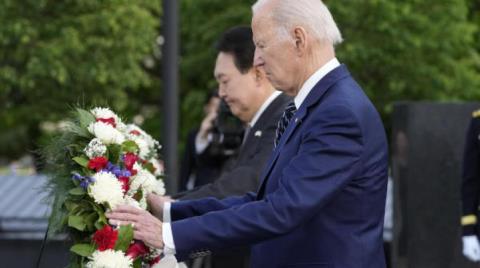
Experts describe meeting of the leaders of the US, India, Australia and Japan as a ‘significant development’
Analysts do not expect Afghanistan to be high on the agenda during the talks hosted by Biden, with the focus instead mainly on China
NEW DELHI: India’s Prime Minister Narendra Modi will attend the Quad summit that is due to take place at the White House on Sept. 24. The meeting will be hosted by US President Joe Biden, and the other participants will include Scott Morrison and Yoshihide Suga, the prime ministers of Australia and Japan respectively.
The four leaders are expected to discuss “contemporary global challenges” and the progress of a COVID-19 vaccine-sharing initiative launched in March, the Indian Foreign Ministry said on Tuesday. The summit will mark the first in-person meeting between Modi and Biden since the latter took office in January.
The Quadrilateral Security Dialogue, also known as the Quad, is a strategic group formed by the four nations in 2007 to reinforce efforts to address regional challenges.
“The summit will provide a valuable opportunity for dialogue and interactions among the leaders, anchored in their shared vision of ensuring a free, open and inclusive Indo-Pacific region,” the Foreign Ministry said.
This month’s gathering follows a virtual summit six months ago, during which the members discussed the pandemic and launched their vaccine-sharing plan.
“As part of their ongoing efforts to contain the COVID-19 pandemic they will review the Quad vaccine initiative, which was announced in March this year,” the ministry said.
The meeting of the four leaders will take place less than a month after US troops completed their withdrawal from Afghanistan, and the Taliban’s subsequent return to power in the country. It is unclear whether these developments will be on the agenda for the summit.
The Foreign Ministry said the four leaders will “discuss regional issues of shared interest” and added: “They will also exchange views on contemporary global issues such as critical and emerging technologies, connectivity and infrastructure, cybersecurity, maritime security, humanitarian assistance or disaster relief, climate change and education.”
Experts on foreign policy described the summit as “a significant development” but were skeptical about whether Afghanistan is likely to feature prominently on the agenda.
Pranay Kotasthane, deputy director of the Takshashila Institution, a think tank in Bangalore, told Arab News: “The (Quad’s) working groups on COVID-19 vaccines, critical and emerging technologies, and climate change were formed after the March summit, so I expect some announcements on each of these areas after the September meeting.
“I don’t think Afghanistan will be a major focus area — the focus will be eastwards.”
Harsh V. Pant, head of the strategic studies program at New Delhi think tank the Observer Research Foundation, agreed with this analysis and added: “The rise and rise of Quad is a story that we are witnessing.
“Given the circumstances, now that there are lots of question marks over America’s credibility, the US is also trying to underscore that it remains committed to some of the largest strategic goals — and one of them is its engagement with the important partners in Quad. The diplomatic investment that is being made on Quad is quite significant.”
He told Arab News that the summit is a signal to China, and aims to rally more support for the Quad cause. Beijing has long complained that the group is an anti-China forum, an “Asian NATO,” and a harbinger of a “new Cold War.”
During the March summit Biden, in a message alluding to Beijing, vowed to strive for an Indo-Pacific region that is free, open and inclusive, “anchored by democratic values and unconstrained by coercion.”
Pant said: “Clearly, there is lots of signaling going on in the context of the challenges that (Quad members) face in the Indo-Pacific and the kind of messages they want to send out to countries like China, and also in terms of rallying like-minded countries to the cause of a free and open Indo-Pacific.”
Some analysts urged New Delhi to proceed with caution and “guard itself against being pushed into an anti-China military alliance.”
India and China shares a border that stretches for more than 3,000 kilometers, along which there are occasional disputes.
“Quad is meant to be a counterpoint to China’s regional ambitions, mostly in the Indo-Pacific region,” Sanjay Kapoor, a foreign-policy expert and editor of Delhi-based English-language fortnightly Hardnews, told Arab News.
“After Chinese incursions in the Himalayan region of Ladakh in March 2020, India’s case for a tough policy on China has increased and there are enough reasons for it to align with other Quad countries to keep China at bay.
“But India would be wise to take its own decisions rather than being pushed into it,” he added, noting that India is the “poorest country in the Quad” and might “suffer enormously” in the event of a military or economic confrontation.
In June last year, military clashes between India and China at the Galwan Valley in Ladakh claimed the lives of 20 Indian soldiers and a few Chinese troops.
“India has also kept in mind that the Quad talks about freedom of navigation in the Indo-Pacific, but nothing about China’s territorial ambitions that put it in conflict with India,” Kapoor said.
He expressed concern about the possibility of “growing military cooperation” between India and the US after Modi’s visit to the White House this month.
“India is inching closer to the US position on Quad (which is shaping the group to be a military counterpoint to China),” said Kapoor.
“Modi’s trip to Washington could open another chapter in increased military cooperation between the four countries and also in building a bulwark against perceived terror networks.”










